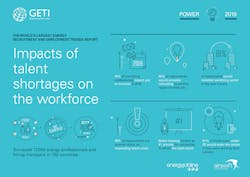Trends Report: Power Companies Facing Labor Shortage and Skills Gap
Power companies are facing a difficult task balancing the need to address talent shortages with adapting to the changing skills needs resulting from digitalization, according to the third annual Global Energy Talent Index (GETI). The world’s largest energy recruitment and employment trends report was recently released by Airswift, the global workforce solutions provider for the energy, process and infrastructure sectors, and Energy Jobline, a job site for the energy and engineering industries.
Airswift and Energy Jobline surveyed more than 17,000 energy professionals and hiring managers in 162 countries across five industry sub-sectors: oil and gas, renewables, power, nuclear and petrochemicals. According to the report, 48 percent of power professionals are concerned about an impending talent emergency, with 32 percent believing the crisis to have already hit the sector and 38 percent reporting that their company had been affected by skills shortages.
The problem is most profound in engineering, with 62 percent of respondents citing that as the discipline most affected by talent shortages, with project leadership a distant second on 22 percent. When it comes to specific skills gaps, problem-solving (29 percent), leadership (19 percent) and process management (13 percent) lead the way.
Janette Marx, chief executive officer at Airswift, says the report found that the biggest concern of the energy workforce is the skills gap.
"The need for more engineers points to an industry concerned with meeting its immediate needs, but the skills respondents identified are exactly those you need to successfully manage change – something firms will be doing a lot of as they adapt to automation," Marx says. It looks as though the power sector has one eye on the present and one firmly on its digital future.”
In addition to providing much-needed insights into the skills gap, GETI also provides data about salary and mobility. Key findings within power include:
- Remuneration is on the up. Fifty-seven percent of non-hiring professionals report an increase in pay over the past 12 months, with 29 percent citing a raise of more than five percent
- Seventy-four percent of non-hiring professionals anticipate further pay raises in 2019 – with 44 percent expecting remuneration to rise by more than five percent.
- Ninety percent of professionals would consider relocating to another region for their job, with career progression opportunities the number one factor attracting talent to a region.
- Renewables provides the biggest source of competition for talent, with 47 percent of those open to switching sectors attracted to the industry, followed by oil and gas at 40 percent.
Hannah Peet, managing director at Energy Jobline, says: “Competition between sectors remains as fierce as ever, but power businesses are set up very well for success. The sector has done a fantastic job of offering stability, security and steadily-increasing remuneration. Furthermore, hiring managers understand what those skill shortages are and know where to go to alleviate them."
Peet says the next step is to take action.
"Graduate training schemes and increased use of apprenticeships will help, but the power sector needs to do a better job of marketing itself to young, digitally-inclined talent. Otherwise, transformations like the smart grid can’t fulfill their full potential," Peet says.
Download the report for more information.

